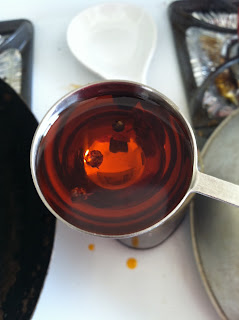You can purchase a commercial variety of Raiyu at at Chinese or Asian grocery store, but it really does not taste the same as making your own!
I use this to temper stir fry, to give them a little heat, or in soups to give them a little extra spice, which is particularly nice in winter months. The roasted peppercorns give it a distinctive smoky complexion.
The difficulty with this recipe is that their are no exact proportions, as it really depends on how spicy you want the oil. I like my oil really spicy, but at the same time, I don't like wasting a perfectly good fresh chili just to make sauce.
I stumbled upon a solution when I ordered some tea smoked duck sauteed with roasted chilies from a local Sichuan restaurant in Solano, CA (China Village). They make a delicious spicy duck with hints of smoky complexity. After you finish the meal, you have a whole bunch of chilies left over. There is no reason to waste those and throw them out!
I supplemented the flavor with infused Sichuan peppercorn oil, which I got from Susanna Foo's cookbook.
This double frying technique really twists out some additional flavor from the chili and lends itself to a deliciously complex flavor.
Chilies are really the key ingredient for this recipe. You need to get alot of them. I usually get enough to stuff a empty tomato sauce jar loosely packed with chilis.
Because you are frying all these ingredients in very hot oil, you can get allot of smoke. This is actually really good for the oil and gives it its distinctive smoky flavor. Unfortunately, it can also really stink up your house and cause your smoke detector to go off. I had a coughing spat because of it! If possible, try to do this outside on an open fire or on your bbq (just remove the grill beforehand and place the wok on the hot coals directly).
Ingredients
24 oz glass jar (about the size of a glass tomato sauce jar) with lid
Vegetable oil, 1 cup
Sesame seed oil (胡麻油 Goma Abura), 1 cup
Sichuan peppercorn oil, 1/4 cup
2 large pieces dried mikan (tangerine) peel
2 tablespoons roasted Sichuan peppercorns
Lots of fresh or dried chilies
5 garlic gloves, peeled and whole
1. Add all the different oils into the wok and heat until very hot, almost smoking.
2. Add the dried mikan and fry for a few minutes until the flavor is released
3. Add roasted Sichuan peppercorns and cook for a few minutes
4. Add the dried or fresh chilies. Continue to fry until the chilies start to darken. Before they turn black, reduce the heat or remove from heat.
5. Add the garlic last, allowing the garlic to fry a dark golden brown. If oil is too hot, you will blacken the garlic which will give it an off flavor. If you see the garlic getting to that blackened stage, remove it with a slotted brass strainer. If the oil is the right temperature, the garlic will turn golden brown and remain that way.
6. Remove from heat. Let the mixture cool thoroughly. The oil should take on a dark reddish hue.
7. I usually store it in a large glass tomato sauce jar with a lid. I will usually discard the fried garlic and strain out the peppercorns, allowing the mikan and the chilies to remain. I then will take the chilies and mikan peel and stuff them back into the glass jar and funnel the oil back into the jar. At this point, the oil is ready to be used for cooking.
The nice thing about storing it with the mikan and the chilies is that the oil continues to absorb the flavor of both ingredients.


Rennee Foods’ Chinese Red Chili Sauce adds the perfect spicy kick to your dishes — ideal for noodles, stir-fries, and snacks!
ReplyDelete